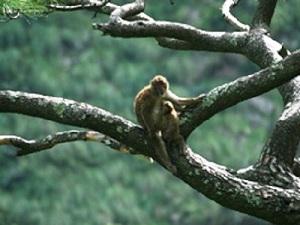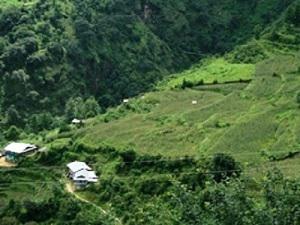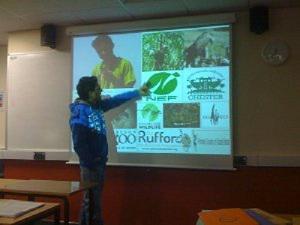Ganga Ram Regmi
Other projects
14 Feb 2008
Population Status, Threats and Conservation Measures of the Assamese Macaque in Langtang National Park, Nepal
16 Jan 2012
Mapping Crop-Raiding Hotspots and Predicting Actual Crop-Raiding Risk Using a Spatial (GIS) Model for Alleviating People-Primate Conflict in Nepal
The aims of this project are to involving local people in the conservation of the Assamese macaque in Langtang National Park for building consensus and generating site-specific conservation assessments for its management planning.

Mother and infant of Assamese macaque in Langtang National Park.
Langtang National Park is a prime habitat of Assamese macaque but conflict with local farmers due to crop-raiding has been made this species vulnerable. For species and its habitat to be conserved effectively, this conflict must be addressed urgently. A management plan also needs to be developed in context of direct interactions and engagement with farmers and not in academic isolation. Local people should be made aware of the role of primates in ecosystem and the possibility of primate tourism, which could be an alternative source of income for subsistence farmers and effectively help to reduce the conflict with the macaques. People residing in and around the park feel neglected and lack awareness about urgency and the nature of efforts is being made towards conservation and wildlife protection. This is one important reason that makes conflict resolution between the Park authorities and the local people very difficult. This project will therefore assess perceptions of local people towards conservation of Assamese macaques, develop and distribute outreach materials, and foster community efforts leading to habitat improvement and overall conservation through consultations and consensus building. The major activities of the projects are:-

Community Outreach Programme

The proposed work will create awareness about the value of the Park and the need to conserve it and its wildlife. The local schools in the Park area will be visited and conservation education classes developed to focus students on future conservation activities for safeguarding the vulnerable Assamese macaque and its habitat. Conservation experiences will also be shared with teachers and community members through discussion meetings and workshops.
Primate Survey Training
A two-week intensive field-training programme will be provided to local youngsters and park staffs on primate population census methods so that macaque population monitoring can be initiated and regularly conducted in the Park.
Networking and Public Information
The project will attempt to build a strong network for primate research and conservation through individuals who are interested in primates, especially the Assamese macaque. In due course, an informative website will be developed and maintained to increase communication within the target audience. Printed materials describing the importance of the macaque will be developed and distributed within the local communities at the implementation site.
Impact Survey
To assess the effect of outreach programme on target audience, an impact survey will be carried out with the help of a questionnaire, including semi-structured and open-ended questions, and a pre-designed interview sheet.